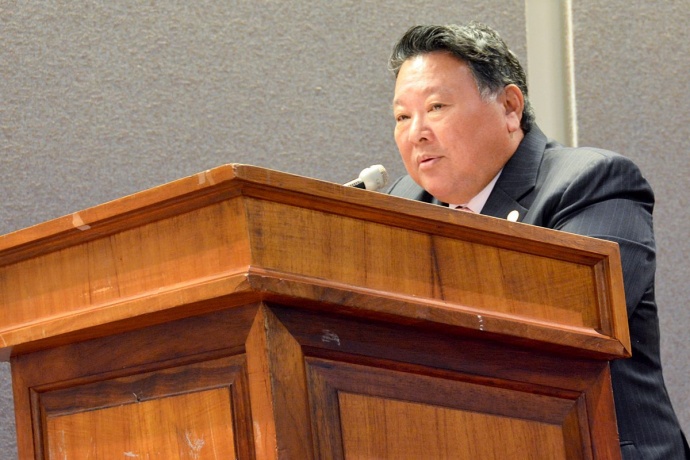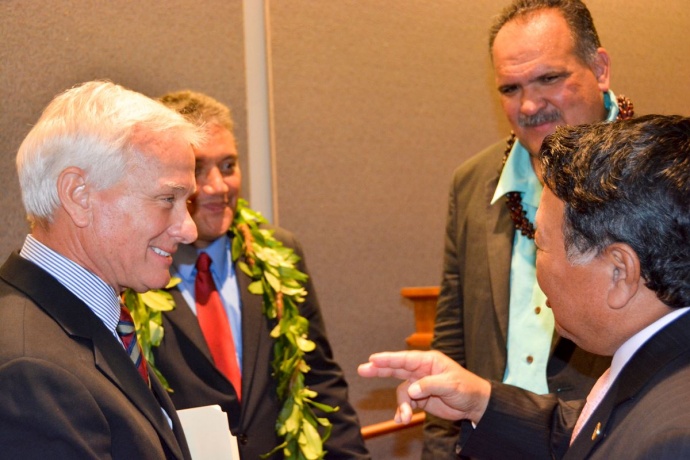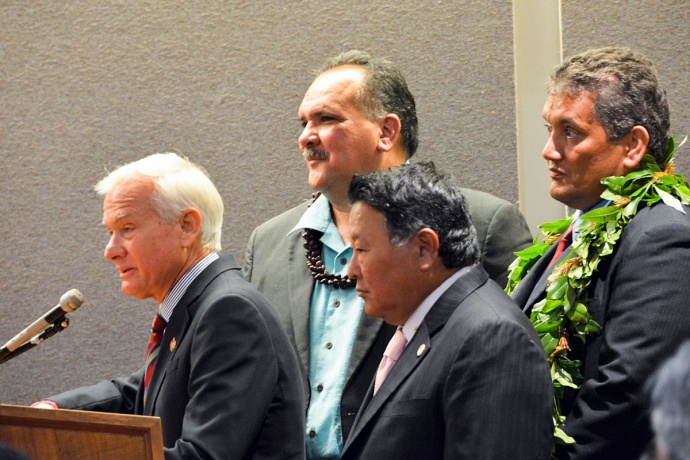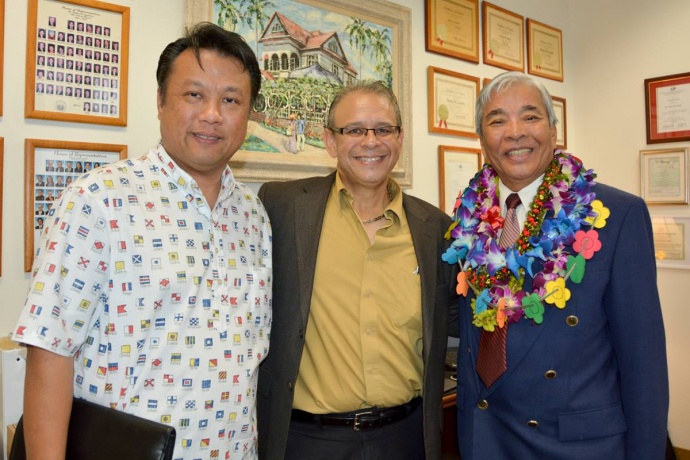VIDEO: Maui Mayor Highlights Legislative Priorities

Mayor Arakawa speaks to members of the Senate Ways and Means Committee and the House Finance Committee during a joint session on Oahu. (1.15.14) Photo courtesy County of Maui.
[flashvideo file=http://www.youtube.com/watch?v=bDv41HUZ298 /] By Wendy Osher
Maui Mayor Alan Arakawa identified priority items that he and other mayors in the state presented before lawmakers this session.
“The mayors all got together and there were two items that we were very insistent on,” said Mayor Arakawa in an exclusive interview with Maui Now.
One of the items was the repealing of the sunset of a beach liability bill.
“What that bill does is it allows the counties to be protected to the same level the state is against frivolous lawsuits. It does not protect us against all lawsuits. If we’re not doing things properly, it’s rightful that we can be sued for it; but we asked for the same protection,” said Arakawa.
The county mayors took the action in anticipation of the bill’s sunset this year, seeking a repeal on the sunset.
“If we don’t have that protection, it may cause huge problems for the counties in that we would be exposed to tremendous amounts of liability,” said Arakawa.

From L to R: Mayors Kirk Caldwell (Oahu), Billy Kenoi (Hawaii), Bernard Carvalho (Kauai) and Alan Arakawa talk story before the joint session of the Senate Ways and Means Committee and the House Finance Committee on Oahu. (1.15.14) Photo courtesy County of Maui.
The mayor cited Kauaʻi as an example saying it has already sent a letter to the state Legislature saying that they could pull their lifeguards off the beaches due to the liability concern.
“We’re trying hard not to get into that situation,” said Arakawa. “Whether we live in Maui County, we’re still a part of the state of Hawaiʻi, so why shouldn’t we get the same kind of protection?”
“If we get sued in the millions of dollars, it would really disrupt all of the things the county needs to be able to do like fix roads, fix our water system…,” said Mayor Arakawa.
“We may actually have to consider removing our lifeguards and closing down a lot of the beaches — which would be one of the things we absolutely don’t want to do. The simple remedy is keep the liability protection that we currently have in place,” he said.

Oahu Mayor Kirk Caldwell speaks as Mayors Bernard Carvalho (Kauai), Alan Arakawa and Billy Kenoi (Hawaii) look on during a joint session of the Senate Ways and Means Committee and the House Finance Committee on Oahu. (1.15.14) Photo courtesy County of Maui.
The second major issue that was discussed was the retention of the county’s portion of the TAT–Transient Accommodations Tax, and to be able to get up to a 1% General Excise Tax.
The Legislature capped the amount of Transient Accommodations Tax that the counties can receive, with Maui County currently getting around $20 million a year, according to government officials.
“If the cap were removed, Maui County would get somewhere around $80 million, I believe,” said Mayor Arakawa.
“There’s a tremendous amount more that the state Legislature has been taking off from the Transient Accommodations Tax for themselves, rather than bringing it back to the county — which is why we were very concerned if they could cap us, they could take all the excess,” he said.
Arakawa continued, “In self defense, we put in the GET as an alternative in case the TAT were removed. This was to protect the communities and our budget if that were to occur.”
At the opening ceremonies, Speaker Joe Souki, voiced support for removing the cap on the TAT, and returning all the money to the counties. In response, the mayor said, that “would be great; but because we don’t know what the Legislature is going to do, we have to put in something there that will allow us to have some defense.”
“The odds of it being passed are pretty slim, and that would really depend on whether or not the Transient Accommodations Tax is being removed or not,” said Arakawa.
“People need to understand that the reason we’re asking for the General Excise Tax is that for the last two years, the Legislature has been talking about taking away our Transient Accommodations Tax.”

Mayor Arakawa’s Chief of Staff Herman Andaya and Executive Assistant Mike Molina with House Representative Romy Cachola before the joint session of the Senate Ways and Means Committee and the House Finance Committee on Oahu. (1.15.14)
The mayor said the ability to go to the GET would rest with the councils.
“The way that the bill was sent down was we’d have one year — this year — to be able to pass the GET, and this was primarily if the TAT was taken.
“It wasn’t an independent bill all by itself to say if we’re ever going to get this ability to have the GET, which is something that was left out of most of the commentary.
“It was meant as a protective measure for the counties in case the Legislature took the Transient Accommodations Taxes,” said Mayor Arakawa.
The mayor also cited invasive species and the little fire ant as a top legislative priority as well, but one that was not included in the collaborative state-wide mayoral presentation to the Legislature.
The mayor included the item along with a request for increased agricultural personnel as part of his discussion on Maui-specific priorities.










